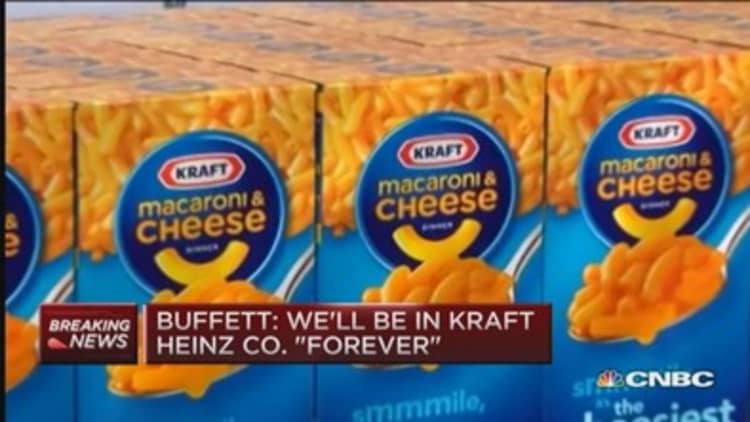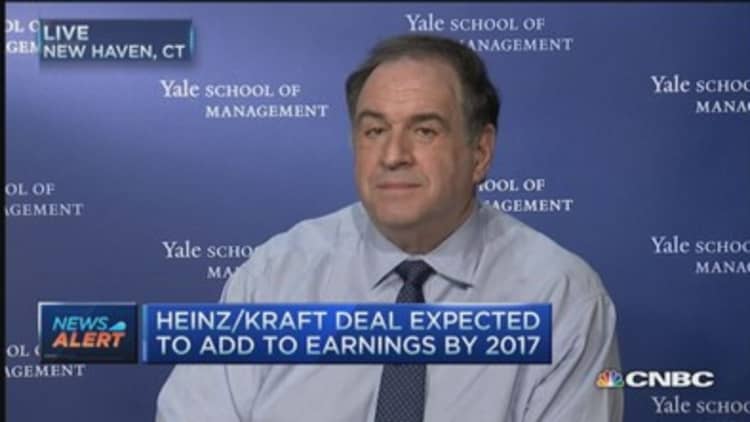
Kraft Foods Group stock surged Wednesday after the company announced a merger deal with H.J. Heinz financed in part by Warren Buffett.
Buffett told CNBC that his Berkshire Hathaway company will have $9.5 billion worth of common stock in the newly merged H.J. Heinz-Kraft Foods company. It will be headed by Heinz Chief Executive Bernardo Hees.
Read MoreWe have about $9.5B in the new Kraft-Heinz: Buffett
Shares of Kraft Foods were were trading 37 percent higher at about $84 on Wednesday after opening at a new all-time high going back to Kraft's spinoff from its snack food business—now Mondelez International—in October 2012.
Earlier, the companies said Kraft shareholders will receive stock in the combined company and a special cash dividend of $16.50 per share, financed by a $10 billion investment from private equity firm 3G Capital and Berkshire Hathaway.
Under the terms of the deal, Heinz will return to the public market with a 51 percent ownership of Kraft. Current holders of Kraft stock will own 49 percent of the company.
The new company will have revenue of about $28 billion, the companies said. That's less than half that of market leader PepsiCo in 2014. It will have eight brands worth more than $1 billion each and five worth $500 million-$1 billion each, the companies said.
The deal is unlikely to face antitrust hurdles because there's little overlap in the companies' products, analysts said. Kraft sells cheese, Oscar Mayer meats, packaged meals and Maxwell House coffee, while Heinz makes ketchup, sauces and frozen foods.
Brazil's 3G and Berkshire Hathaway bought Heinz for $23 billion and took the company private in 2013 in the largest ever deal in the food industry. Since then, Heinz has fired hundreds of workers and closed factories.
Read MoreKraft recalls 6.5M boxes of Mac & Cheese
While the deal can save costs through economies of scale, combining the companies does not create long-term revenue growth potential, Ken Goldman, senior food analyst at JP Morgan, told CNBC's "Squawk on the Street."
The special dividend is the clear upside for shareholders, Alexia Howard, U.S. food analyst at Sanford Bernstein, told CNBC's "Squawk Box," adding that the rest of the deal simply represents a merger of two entities.
Investors should focus on the relative EBITDA, or earnings before certain expenses, of the combined companies for a better read on its future. The deal also offers investors clarity on the future of Kraft following months of speculation over how it would remedy its beleaguered business, she said.

Kraft has struggled to keep up with the changing consumer tastes in recent years, and in November it fired most of its advertising agencies amid slowing sales and declining volume.
The following month, it replaced CEO Tony Vernon, who led the company for two years, with its board chairman, John Cahill, whose experience includes a tenure at private equity firm Ripplewood Holdings
Kraft's brands are currently focused in the United States, so combining with Heinz provides a platform for international distribution, Erin Lash, senior equity analyst at Morningstar, told CNBC.
Lash said she will be looking for guidance on cost savings that 3G and Berkshire Hathaway expect the deal to generate, as well as signs for how the partners will handle the mix of brands in the portfolio.
"Kraft continues to operate with still some lackluster brands like Jell-O that they've been unable to turn around despite several attempts to do so," she said on "Squawk Box."
Read MoreVelveeta shortage sparked by high demand, Kraft says
In addition to Jell-O, the company has struggled with other high-margin, heavily processed foods, including Velveeta cheese, Crystal Light and Kool-Aid beverages, and Macaroni & Cheese. Kraft's Oscar Meyer and Philadelphia cream cheese brands have been performing well, she said.
Buffett's Berkshire Hathaway held nearly 193,000 Kraft shares as of the firm's most recent SEC filing.
Asked whether Buffett is making a mistake by getting involved in a processed food company at a time when Americans are shifting to smaller, more nutritional brands, Howard noted that 3G's cost-saving structure has allowed Heinz to become more profitable, despite the fact that it's frozen foods business is shrinking.
"From a profit perspective and a shareholder value perspective, it makes a lot of sense, but in terms of the long-term growth algorithm on the top line of the industry, I think they are coming down," she said.
—CNBC's Gina Francolla and Reuters contributed to this story.


